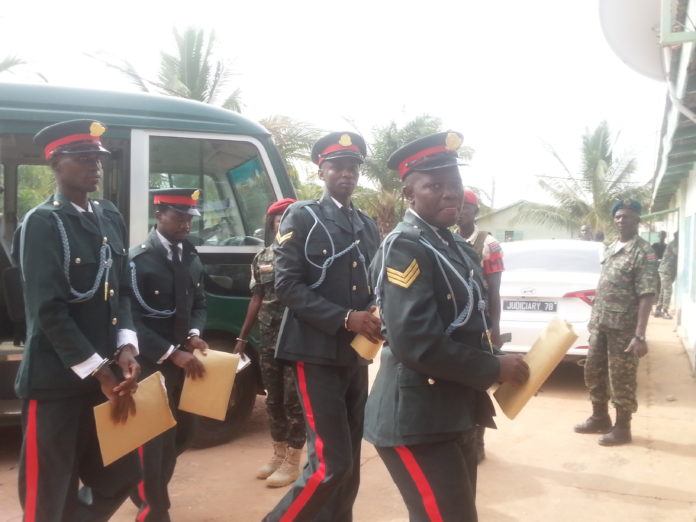By Yankuba Jallow
Panelists of the General Court-Martial on Monday ruled against the defence in the trial within trial, and admitted the cautionary statements that were in contention.
The trial within trial came about when the second and third accused persons through their attorney Lawyer Sherriff Kumba Jobe, objected to tendering of the cautionary statements by rejecting them as not their own. Defence Counsel Jobe said the Court should not admit the cautionary statements that the prosecution want to tender because they did not adhere to the procedure set by the Evidence Act and other applicable laws.
During this trial, the prosecution brought four witnesses in the persons of Captain Alagie Camara, Bernard Jatta (the independent witness), Lieutenant Isaac Jammeh and Faring Sanyang.
The second and third accused persons gave evidence that they were tortured by the authorities.
Lieutenant Abdoulie Jarju during cross-examination by State Counsel Yusuf, told the panelists that his face was covered and was tortured before his cautionary statement was taken; that he sustained injuries as a result of the beatings he received.
“I was beaten because I refused to sign the cautionary statement tendered before me at the NIA headquarters in Banjul,” Lieutenant Jarju said.
Lieutenant Yaya Jammeh when giving evidence before the Court-Martial, said the Cautionary Statement that was tendered in Court and marked as exhibit PVD1A, was not his but written by Captain Alagie Camara, one of the investigators and fourth prosecution witness in the case.
Lieutenant Jammeh told the Court-Martial that after he told the investigators at the NIA that he knew nothing that was happening at the AU Villa, he was taken to a separate room where he was tortured.
“My hands were cuffed and my legs were tied. My head was forced into a pan filled with water” he said. “After my head was pulled from the pan, I was asked to give a different statement but I still maintained my position that I know nothing that took place at the time,” he said.
He continued in his evidence that his private part was tied so that it was difficult to pass urine out; that one of those who tortured him was his junior in the military in the person of Lieutenant Yusupha Jallow, who was an investigator and now a prosecutor in this case.
The second accused person said “there is nowhere in the GAF ethics that a junior should look at the private part of his senior, much more to talk of torturing him or her. I was seriously tortured by Captain Alagie Camara (the 4th prosecution witness) and Lieutenant Yusupha Jallow (a prosecutor and a former investigator in this criminal suit).”
He said his cautionary statement was recorded in the absence of the Independent witness, Bernard Jatta, who is the fifth prosecution witness.
The Court-Martial in its Monday’s ruling held that the second and third accused persons denying the cautionary statements cannot impede the Court to admit them. The ruling was read by Na-Cissay Wadda who said the reason for a trial within trial is to ascertain whether the cautionary statements were obtained voluntarily or otherwise; that since the accused persons denied the cautionary statement, they will be admitted and marked as exhibits. In her ruling, she implied that the cautionary statements that are in contention, have been denied by the second and third accused persons; that the court cannot look into whether the cautionary statements were recorded voluntarily or not because the accused persons have denied that the documents are theirs. The Court relied in its ruling on the issue of denial and retraction. It held that the accused persons’ denial cannot hinder the admissibility of the Cautionary Statements in Court, by relying on certain authorities such as Law Publications, Section 31 (2) of the Evidence Act 1994 and the case of Mballow and Bass against the State.
The matter was adjourned to today at 9 O’clock in the morning for continuation of hearing.
The 12 soldiers are facing prosecution on 9 counts namely: commuting a civil offence punishable under section 83 of the Gambia Armed Forces Act (GAF Act) that is to say Treason Contrary to Section 35 (1) (d), incitement to mutiny contrary to section 47 (a) of the GAF Act, failure to report mutiny contrary to section 47 (e) of GAF Act, conspiracy to commit mutiny contrary to section 7 (b) of the GAF Act, Endeavour to persuade members of the Armed Forces to take part in mutiny contrary to section 47 (c) of the GAF Act, Negligent or wilful interference with lawful custody contrary to section 65 (c) of the GAF Act, Connivance of desertion contrary to section 54 (a) of the GAF Act, Connivance of desertion contrary to Section 54 (a) of the GAF Act and Negligent interference with lawful custody contrary to section 65 of the GAF Act.
















